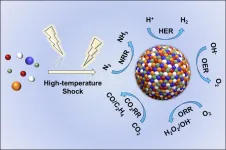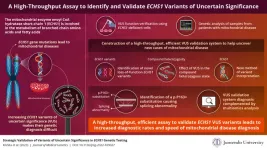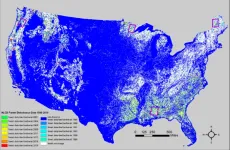(Press-News.org) Climate change is likely to abruptly push species over tipping points as their geographic ranges reach unforeseen temperatures, finds a new study led by a UCL researcher.
The new Nature Ecology & Evolution study predicts when and where climate change is likely to expose species across the globe to potentially dangerous temperatures.
The research team from UCL, University of Cape Town, University of Connecticut and University at Buffalo analysed data from over 35,000 species of animals (including mammals, amphibians, reptiles, birds, corals, fish, cephalopods and plankton) and seagrasses from every continent and ocean basin, alongside climate projections running up to 2100.
The researchers investigated when areas within each species’ geographical range will cross a threshold of thermal exposure, defined as the first five consecutive years where temperatures consistently exceed the most extreme monthly temperature experienced by a species across its geographic range over recent history (1850-2014).
Once the thermal exposure threshold is crossed, the animal is not necessarily going to die out, but there is no evidence that it is able to survive the higher temperatures – that is, the research projects that for many species there could be an abrupt loss of habitat due to future climate change.
The researchers found a consistent trend that for many animals, the thermal exposure threshold will be crossed for much of their geographic range within the same decade.
Lead author Dr Alex Pigot (UCL Centre for Biodiversity & Environment Research, UCL Biosciences) said: “It is unlikely that climate change will gradually make environments more difficult for animals to survive in. Instead, for many animals, large swaths of their geographic range are likely to become unfamiliarly hot in a short span of time.
“While some animals may be able to survive these higher temperatures, many other animals will need to move to cooler regions or evolve to adapt, which they likely cannot do in such short timeframes.
“Our findings suggest that once we start to notice that a species is suffering under unfamiliar conditions, there may be very little time before most of its range becomes inhospitable, so it’s important that we identify in advance which species may be at risk in coming decades.”
The researchers found that the extent of global warming makes a big difference: if the planet warms by 1.5°C, 15% of species they studied will be at risk of experiencing unfamiliarly hot temperatures across at least 30% of their existing geographic range in a single decade, but this doubles to 30% of species at 2.5°C of warming.
Dr Pigot added: “Our study is yet another example of why we need to urgently reduce carbon emissions to mitigate the harmful effects climate change is having on animals and plants, and avoid a massive extinction crisis.”
The researchers hope that their study could help with targeting conservation efforts, as their data provides an early warning system showing when and where particular animals are likely to be at risk.
Co-author Dr Christopher Trisos (African Climate and Development Initiative, University of Cape Town) said: “In the past we’ve had snapshots to show the impact of climate change, but here we are presenting the data more like a film, where you can see the changes unfold over time. This shows that for many species the risk is a bit like everything, everywhere, all at once. By animating this process, we hope to help direct conservation efforts before it’s too late, while also showing the potentially catastrophic consequences of letting climate change continue unchecked.”
The researchers say that this pattern of abrupt exposure may be an inevitable feature of living on a round planet – because of the shape of the Earth, there is more area available to species in environments near the hot end of what they are used to, such as in low-lying areas or near the equator.
A previous study by the same lead authors found that even if we stop climate change so that global temperatures peak and start to decline, the risks to biodiversity could persist for decades after.* In another analysis similar to the current study, they found that many species facing unfamiliar temperatures will be living alongside other animals experiencing similar temperature shocks, which could pose grave risks to local ecosystem function.**
The study was supported by the Royal Society, the Natural Environment Research Council, the National Science Foundation (US), the African Academy of Sciences and NASA.
* https://www.ucl.ac.uk/news/2022/jun/biodiversity-risks-persist-well-beyond-future-global-temperature-peak
** https://www.ucl.ac.uk/news/2020/apr/climate-change-could-cause-sudden-biodiversity-losses-worldwide
END
Climate change to push species over abrupt tipping points
2023-05-18
ELSE PRESS RELEASES FROM THIS DATE:
Engineering: The house that diapers built
2023-05-18
Up to eight percent of the sand in concrete and mortar used to make a single-story house could be replaced with shredded used disposable diapers without significantly diminishing their strength, according to a study published in Scientific Reports. The authors suggest that disposable diaper waste could be used as a construction material for low-cost housing in low- and middle-income countries.
Disposable diapers are usually manufactured from wood pulp, cotton, viscose rayon, and plastics such as polyester, polyethylene, and polypropylene. ...
Why do Japanese teachers seem unready to teach critical thinking in classrooms?
2023-05-18
Globally, critical thinking (CT) is regarded as a highly desirable cognitive skill that enables a person to question, analyze, and assess an idea or theory from multiple perspectives. CT has become an integral and mandatory part of global educational curricula, but its definition varies across contexts and cultural backgrounds.
To assess the implementation of CT, the Organization for Economic Cooperation and Development (OECD) conducts the Teaching and Learning International Survey (TALIS). In a 2018 survey (TALIS 2018), only 12.6% of lower secondary ...
Boosting solar cell energy capture efficiency with a fullerene-derivative interlayer
2023-05-18
Solar cells are a critical component to the transition to renewable energy sources, and enhanced power conversion efficiency (PCE), or amount of power captured with a given amount of sunlight, increases the practicality of solar power in a society with high energy demands. Perovskite solar cells that use all-inorganic perovskite light-absorbing materials are more thermally stable than organic-inorganic hybrid counterparts, but suffer from lower PCE. Researchers have overcome this hurdle in all-inorganic perovskite solar cells ...
Children’s Cancer Research Fund backs cutting-edge leukemia research at UVA
2023-05-18
Children’s Cancer Research Fund has awarded $250,000 to an innovative new approach to treating leukemia – blood cancer – being developed at UVA Cancer Center.
The grant to John H. Bushweller, PhD, of the University of Virginia School of Medicine, is part of the national nonprofit’s efforts to accelerate the development of new and better treatments for difficult-to-treat cancers.
“This funding makes it possible to continue developing a novel approach to treatment for a form of pediatric leukemia with a very poor prognosis,” said Bushweller, of UVA’s Department of Molecular Physiology and Biological Physics. “For ...
Research to improve quality of stroke care is advancing but gaps exist
2023-05-18
INDIANAPOLIS – Every 40 seconds, someone in the U.S. has a stroke. Every 3.5 minutes, someone in the U.S. dies of a stroke. Stroke patients have multifaceted needs, requiring complicated care delivered by multidisciplinary teams.
In the journal Stroke’s annual review of quality improvement advances in stroke care studies, Regenstrief Institute Research Scientist Dawn Bravata, M.D., and colleagues update researchers, clinicians and healthcare administrators on advances in the field, highlighting the challenges of scalability and sustainability.
“Quality improvement exists to ensure that every patient with stroke or at risk of stroke is getting the care ...
High-temperature shock synthesis of high-entropy alloy nanoparticles for catalysis
2023-05-18
High-temperature shock (HTS) is an emerging synthesis method with kinetics-dominated non-equilibrium characteristics, which can achieve an ultrafast heating/cooling rate of ~10^5 K/s and a peak temperature larger than ~3000 K within a time scale of seconds or milliseconds, and is widely used in the preparation of high entropy content, thermodynamic metastable phase and defect-rich materials. Amongst these significant advances, nanoscale high entropy alloys (HEA) are particularly prominent in heterogeneous catalytic reactions with remarkable ...
Analysis showcases potential for more complete revascularizations with Impella compared to IABP during HRPCI
2023-05-18
DANVERS, Mass., May 18, 2023 – Abiomed, part of Johnson & Johnson MedTech[1], announces results of a third-party analysis showing that utilizing Impella during high-risk percutaneous coronary intervention (PCI) procedures may help physicians achieve a more complete revascularization compared to high-risk PCIs supported using an intra-aortic balloon pump (IABP). Previous studies have shown that a more complete revascularization can lead to longer survival[2],[3], a greater reduction in heart failure and angina symptoms[4], and an improved quality of life for the patient[5].
This analysis shows ...
Novel high-efficiency assay promises rapid mitochondrial disease diagnosis
2023-05-18
The gene ECHS1 encodes for enoyl-CoA hydratase short-chain 1, a mitochondrial enzyme involved in branched-chain amino acid and fatty acid metabolism. Rare inherited mutations in the ECHS1 lead to mitochondrial ECHS1 deficiency, resulting in the disruption of the metabolism of the essential amino acid valine and accumulation of valine intermediates.
In fact, ECHS1 is one of the most common causative genes of mitochondrial diseases. These mutant enzymes also cause brain lesions and severe delays in a child’s psychomotor development, along with elevating blood lactate levels. ECHS1 variants have been reported globally, and many disease-causing ...
A new tool for deforestation detection
2023-05-18
Every second, the planet loses a stretch of forest equivalent to a football field due to
logging, fires, insect infestation, disease, wind, drought, and other factors. In a recently published study, researchers from the U.S. Geological Survey Earth Resources Observation and Science (EROS) Center presented a comprehensive strategy to detect when and where forest disturbance happens at a large scale and provide a deeper understanding of forest change.
The study was published on Feb. 28 in the Journal of Remote Sensing.
“Our strategy leads to more accurate land cover ...
To avoid a battery crisis, more of us should share small, lightweight EVs
2023-05-18
Most global scenarios and governmental targets for decarbonizing the transport sector consider battery-powered electric vehicles as a main part of the solution. Enormous amounts of raw materials are needed to build enough batteries and ensure a transition to low-emission vehicles.
Access to lithium is critical, as it is used in all types of EV batteries.
Future demand needs to decrease
“It seems very likely we'll have a shortage. The key lies in the demand. The demand needs to decrease to avoid long-term supply problems,” ...







